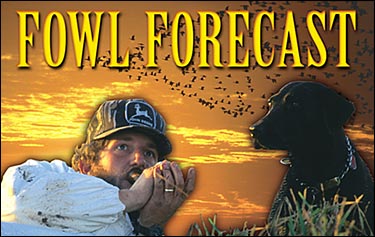
Expect a 'Goosed-Up' Season,
With Increased Limits
on Snows, Specks and Canadas
By Larry D. Hodge
Page 2
The Texas coastal prairies, which are often referred to by the names of nearby communities such as Lisse, Garwood, Eagle Lake, El Campo and Katy, lie at the terminus of the great Central Flyway, a conduit for waterfowl running straight from the breeding grounds in the Arctic. As winter begins to grip Canada's far north and ponds turn to ice, geese hitch rides south on blustery cold fronts. Specks and snows begin arriving by early November, but the Canadas may not be present until December. Once they arrive, the game is a-wing.
Anyone who's slogged through foot-deep mud in a flooded rice field and worked up a sweat putting out several hundred rag decoys might argue the premise that goose hunting is a mental game. But every hunt begins like a chess match, with the guide trying to anticipate the moves the geese will make so he can get hunters and honkers together on the morrow.
"A lot of people call and want to know which prairie is hot," Tyler says. "But prairies have nothing to do with it. You can have two fields a quarter of a mile apart, and only one will be hot. If geese start feeding in a field and you don't hunt it, they will stay with it. They may feed in it four or five days and then leave. You can't compare it to a deer lease," he adds, "where the deer will be present all season long. Geese are like locusts. They come into a field, eat up all the food, and go somewhere else."
At night, geese fly to the nearest open water to roost before heading out in the morning to feed. The trick is to be where the geese go when they leave the roost.
Tyler quotes his father, Marvin, who practically invented modern goose hunting. He always maintained that you "cannot call a goose that does not want to decoy."
Scouting, then, becomes the single most important factor in a successful goose hunt. "The following day's hunt begins the morning of the day of your hunt," Tyler says. "While that hunt is going on, the guide is scouting the horizon for other geese going down. He looks for flyways, for holding ponds geese are getting off of, where geese that don't come to him are going." After wrapping up the morning's hunt and grabbing lunch and a few winks, the guide spends the rest of the afternoon looking for geese feeding in fields.
"Once you find where the geese are going, you have to find a place to leave the vehicles, find a gate into the field, walk out into the field to check its conditionÑall without spooking the geese," he explains. "Then you have to look for alternative fields in case you can't hunt that one, and for each field you have to know which roosting pond the geese are using, because you want to know which direction they will be coming from in the morning."
A day that began at 3 a.m. for the guide doesn't end until after the weather on the 10:00 news. It begins all over again in less than 5 hours. No wonder guides are disappointed when hunters let geese escape.
But when it does all come together, few things in the outdoors more closely resemble magic. It begins with a distant clamor arising from a roost pond as every goose loudly announces its plans for the day. Suddenly one end of the flock takes wing, and within seconds thousands of birds roll up from the ground, wings thundering.
Hunters' hearts race, palms sweat. Retrievers, normally a seething bundle of barely controlled energy, become masses of bundled springs waiting for the bark of a shotgun to uncoil.
Hunters hug the earth beneath incoming geese like soldiers waiting for an artillery barrage. The guide mouths the call, then sends a raucous chorus skyward. The effect, clearly visible even at a distance, is immediate. Heads swivel toward the sound. The lead goose banks and heads for the bits of white plastic fluttering on the prairie, the rest of the flock pumping hard to keep up.
Then the sight hunters long for appears.
The geese stop flapping and set their wings, losing altitude, sideslipping lower and lower until their feet dangle just yards overhead and the guide bellows, "Take 'em!"
There's one other thing you should know about goose hunting: It's addictive.
# # # #
page 1 / page 2
| 
